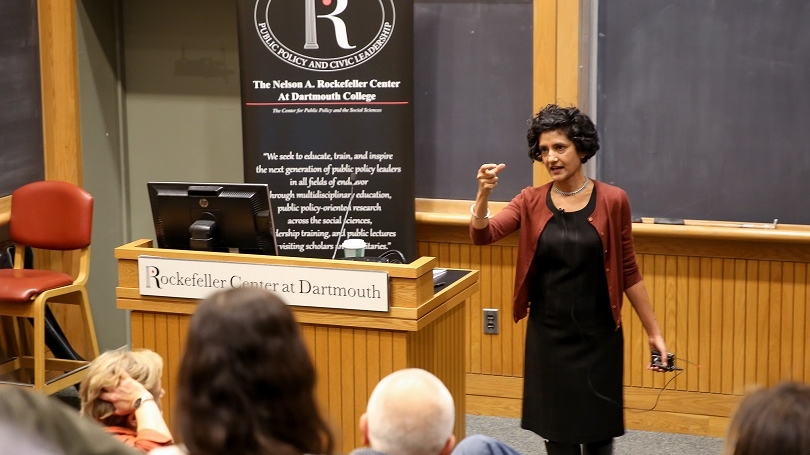
- Public Policy
- Leadership
- Funding
- News & Events
- About the Center
Back to Top Nav
Back to Top Nav
Back to Top Nav
Back to Top Nav
New York Times journalist Somini Sengupta gave a public talk on “Lessons from the Existential Threats Beat: How the Rules of War Are Broken” at the Nelson A. Rockefeller Center for Public Policy in April of this year. Readers familiar with Sengupta’s writing, recognize it for her unique drive to highlight the people impacted by global issues such as violent conflict, and in her talk she stressed the importance of hearing individual voices.
“Wars change the world order … but on a more intimate level, people are changed by war. In war time we demonstrate profound courage and profound depravity.”
To Sengupta, the stories of an all-female choir in Damascus or of young men huddled in a compound about to be smuggled across central Africa are just as – if not more – important than the dominant narratives that look at conflict from a bird’s eye view.
Journalism’s main goal is to “not allow history to fail us, not allow the world’s powerful to forget the world’s powerless,” says Sengupta.
Somini Sengupta did not always know that journalism was her calling. “I stumbled into writing about war,” she commented during a lunch with students earlier that day. When the New York Times asked who would like an assignment to cover countries in western Africa, the Tamil Tigers in Si Lanka, the Maoist rebels in Nepal, the Iraq invasion, and later Syria, she raised her hand.
While covering these conflict zones, Sengupta realized that while most of the rules in war are to protect and shield civilians from the “barbarity of war,” today’s battlefields include hospitals and schools. “They used to mark buildings with a [red] cross” to signify a medical center, but now that’s changed.”
More than anything else, Sengupta blames international organizations like the U.N. which were designed to prevent and mitigate conflict for being “spectacularly ineffective at performing its job.” Sengupta argues that the UN Security Council “doesn’t represent the world today.” Instead of enforcing international law and norms, countries on the Security Council veto the creation of an international investigation that would reveal who is using chemical weapons in Syria.
“The most powerful countries in the world, when presented with the plea to not use their veto vote in the instance of mass atrocities, shrugged.”
Somini Sengupta concluded her talk with the warning that “norms are fragile,” rules “were made by powerful people and can be unmade by powerful people.”
Written by Lauren Bishop ’19, Rockefeller Center Student Program Assistant for Public Programs
The views and opinions expressed and any materials presented during a public program are the speaker’s own and do not necessarily represent the views and opinions of the Rockefeller Center or constitute an endorsement by the Center.